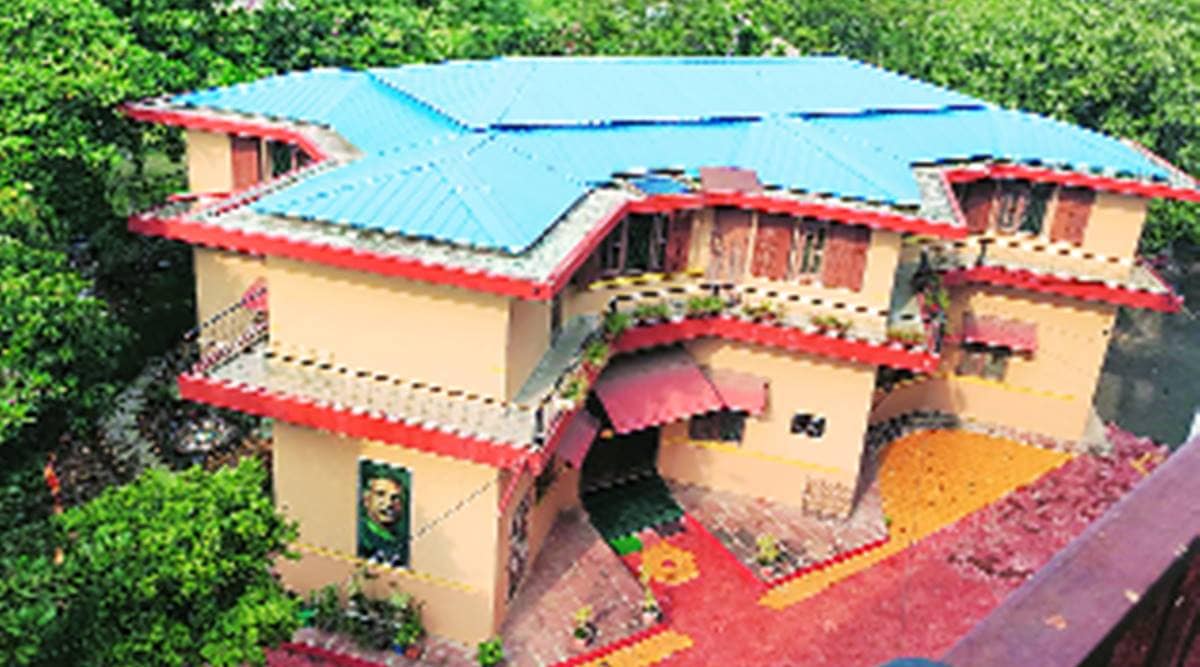 The Dhrupad Sansthan in Bhopal. (Photo: Iram Siddique)
The Dhrupad Sansthan in Bhopal. (Photo: Iram Siddique)A heavy silence hangs over Dhrupad Sansthan, the residential music gurukul located on the outskirts of Bhopal. For the last one week, the stillness has been broken only by hushed talk — about the sexual misconduct allegations against two of its gurus, Ramakant and Akhilesh Gundecha, and about the fact that their brother, Umakant Gundecha, who heads the institute, continues to hold classes.
Days after The Indian Express reported allegations of sexual harassment against Ramakant and Akhilesh Gundecha, notable names in the classical musical form of Dhrupad, six of the 24 students left the gurukul. Students said six more would leave by Sunday. “There will be more exits next week,” a student who belongs to Delhi said.
What has triggered the disquiet is not just the allegations but also the way the Sansthan has handled the matter. Students accuse that the internal complaints committee set up to probe the charges has people “either connected to the family or the Dhrupad Sansthan”, and that Umakant Gundecha, the chairperson, dragged his feet on distancing Akhilesh from activities at the gurukul.
The complaints committee comprises social activist Sushama Iyengar, who studied at the Dhrupad Sansthan under the Gundechas; Mona Dikshit, the daughter-in-law of former Delhi chief minister Sheila Dikshit who used to visit the Sansthan; retired IAS officer Anshu Vaish; and a former Madhya Pradesh district and sessions court judge, Munshi Singh Chandrawat. An online meeting of the committee held on September 8 was boycotted by the “affected students”.
Admitting this, Ramakant’s son Anant, who sings with Umakant since his father’s death in 2019, said they were in the process of reconfiguring the committee, and would include students in it. “There are a few students who feel no internal people should be involved, and have not been participating in the meetings. But there are many who have been participating,” he added.
Anant said the family was in talks with students living at the gurukul as well as those across the world for suggestions. “We are trying to make this process as transparent as possible. We truly believe that this institute is made of a combination of its students and gurus. The members we had chosen, we thought, would approach this issue with sensitivity. Now we will come out with a new committee, which will have members from the previous committee and student representatives.”
A group of students recently issued a statement that while the Dhrupad Sansthan had said Akhilesh was “voluntarily” recusing himself from all activities at the institute pending an inquiry into the allegations, the guru had actually resisted. According to the students, a meeting was held on September 2, three days after the Facebook allegations surfaced, presided over by members of the family — Chairperson Umakant, his daughter Dhani and Anant. “He (Akhilesh) was forced to leave the gurukul due to pressure from the students and the mounting evidence,” said the statement.
A Delhi-based student claimed that recently, Umakant had offered a US-based pakhawaj student classes at home by Akhilesh. “This student left on Thursday morning.”
The statement by the students said, “There is no allegation against bade guruji (Umakant), but the way he has acted, only defending his family and not bothering about us, has been extremely dishonourable… They need to accept that the Gundecha family had prior knowledge about such cases of harassment and abuse, but took no action.”
Students at the gurukul said rumours about harassment have been common knowledge within the institution, but that during the lockdown, these became too frequent to be brushed under the carpet. In one instance, Akhilesh allegedly stormed into a woman student’s room and told her “I get what I want”. A student claimed that the guru had become more “brazen” after the death of Ramakant last year. “He was more assertive and demanding. There was also subtle blackmailing in a few cases.”
The 100-room gurukul had seen 11 of its 35 students, many of them Europeans, leave due to the coronavirus pandemic followed by the lockdown in the beginning of the year. In the tradition of gurukuls, students stay on the Sansthan premises, learning music while also doing work like cleaning and cooking.
Now, the students who remain are staying away from classes. “Rumours swirl where the musical notes once used to,” said a young male student on the condition of anonymity.
A senior student, who has been helping Umakant hold classes, said many sessions “have had to be cancelled as students didn’t turn up”. A senior student from the US said, “I did attend a session yesterday but I have not attended one today as it is difficult to focus on music after the allegations.”
The Gundecha brothers are some of the biggest names in Dhrupad, one of the oldest surviving classical music forms in India. Akhilesh is a pakhawaj player who often accompanies them as well as other maestros.
While the meditative, leisurely pace of the music has caused it to lose takers in India, it has seen a revival the last few years due to the efforts of the Dagar family, and musicians such as Uday Bhawalkar, Ritwik Sanyal and the Gundechas. However, its most dedicated audience remains in Europe, where Dhrupad concerts are held regularly.